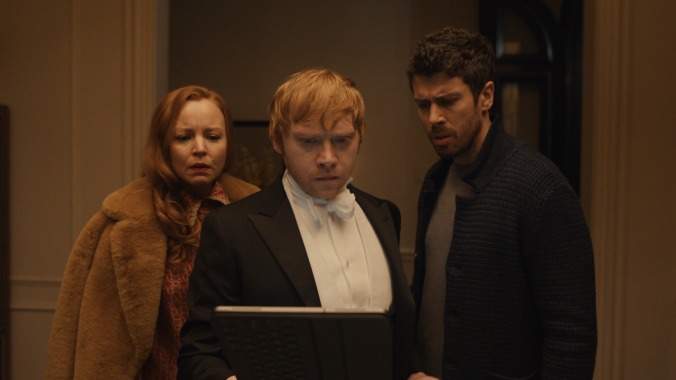Servant’s second season mines darkly absurdist humor from its outsized story


For a show that never met a single food item or piece of architecture it couldn’t turn into an ominous portent, the opening moments of Servant’s second season are perhaps emblematic in a way the show didn’t intend. As Leanne (Nell Tiger Free) reads aloud her job application letter she sent to become Jericho’s nanny, the camera fixes upon the bizarre mural occupying the entire back wall of the Turners’ guest room—the one that viewers of the first season saw and likely wondered, “What the hell is the story behind a bonkers mural like that being painted on the wall of a bedroom?!” We slowly zoom in on the woman being tormented in the painting, and it looks as though we’re going to get some explanation for what, exactly, led to the creation of this Hieronymus Bosch-like nightmare. Instead, the camera cuts away, and the mystery is never addressed. It’s left unsaid, and that rug pull is just the first of many in a season full of them, each revealing little more than another rug. Thankfully, those rugs are a lot of fun to watch.
The first season of Servant largely worked as a self-contained installment, explaining little but creating a satisfying narrative arc in its 10 episodes. Selfish and often unlikable couple Dorothy (Lauren Ambrose) and Sean (Toby Kebbell) suffer the horrific tragedy of the death of their infant son, Jericho, sending Dorothy into catatonia. She is relieved of her depression with the introduction of a therapeutic doll she treats as if it were Jericho and he was still alive. But when nanny Leanne arrives, the big twist occurs: The doll inexplicably gets replaced with a living, breathing child, which Dorothy accepts without question, given her blinkered state of mind. Did Leanne smuggle in this new baby without the couple’s knowledge (is it hers?), or did something supernatural occur? Sean has only Dorothy’s supercilious brother, Julian (Rupert Grint), to confide in about these shocking and potentially legally disastrous circumstances. Gradually, all four come to care for the new child. Naturally, that’s when the other shoe drops: Leanne’s unsettling family—members of a cult thought to be dismantled years prior—appears and demands she quit her post, spiriting her away as the season ends with Dorothy’s horrific discovery that her lovely child has once more been replaced by the lifeless doll.
That chickens-home-to-roost narrative picks up right where it left off with this new batch of episodes, as Dorothy goes into crisis mode, assuming Leanne and her family made off with Jericho and launching a single-minded hunt to recover what she believes to be her child. Sean and Julian, meanwhile, are left scrambling to keep secrets on both sides—continuing to let the police and others who knew about Jericho’s death think Dorothy is still just talking about a therapy doll when she rants about her missing baby, while simultaneously keeping up the façade that the infant is safe and happy when confronted with those in the dark about the whole mess, like Sean’s chef-in-training assistant, Tobe (Tony Revolori). The season follows the three as they search for Leanne and the “new” Jericho, with Julian simply wanting his sister happy and Sean committed to finding the baby he’s grown to care for as if it were his own.
If there was a major issue with season one, it was the dearth of answers to a surfeit of mysteries; every new curlicue of plot led to more questions, without much treatment of the already existing ones. But those hoping season two will clear up those questions may find themselves frustrated—to a degree, anyway. There’s still nothing but the limited perspective of a couple stymied by their situation, and no clear reasons, magical or otherwise, for all that’s transpired, save for the hint that Leanne and others of her kind may hold some power to resurrect the dead. And all the symbolic goings-on—the crumbling foundation in the cellar, Sean’s bizarre maladies—get only the most cursory of attention. There’s a degree of admirable restraint in treating viewers like adults capable of sustaining interest without handholding; but at a certain point, Servant starts to feel Lost-like in its continual piling-on of promise without payoff.
Luckily, season two does possess a much surer sense of blackly absurdist humor about its ever more outlandish story. Whereas the comedy often previously came from the belief-beggaring state of affairs themselves, the show now wisely leans into the aggressively heightened performances of its leads, letting the actors sell the inherent ridiculousness of supposedly rational adults making increasingly outrageous decisions for what they’re convinced are the best of reasons. Ambrose, in particular, has nailed the comic rhythms of Dorothy’s over-the-top moods, locating dark reservoirs of extreme behavior inside her character’s fragile self-assurance. (Explaining why she should take the lead in asking neighbors for help with Jericho’s disappearance, Dorothy earnestly tells her husband, “You don’t have reassuring eyes, Sean.”) But Kebbell and Grint often steal the show with their odd-couple bickering, the pair’s “What do we do now?” responses to Dorothy’s erratic impulses leading to escalating comic set pieces that maintain the bleak intensity of the premise while managing to puncture any self-importance before it topples into farce.
There are shifts in thematic and aesthetic tones, as well, allowing for rich new veins of allegory and allusion to be mined. Whereas much of the first season’s food-porn symbolism was about the messy nature of bodies and flesh, here both food and story have turned into a far headier affair, less grisly and more psychologically knotty. (Though the body horror occasionally pops up, as in Sean’s grotesquely burned hand or the salve containing bodily fluids used to treat it later in the season.) And even as the story continues to expand outward, when the core trio searches other buildings and settings in the hunt for Jericho, Servant resolutely avoids ever leaving the house; any change in scenery is viewed only through the lens of a smartphone camera screen or laptop.
To say where the show goes in its second season would be to quickly enter spoiler territory; by the end of the third episode, enough startling twists have generated sufficient material for an average series’ entire season. But this is Servant, where no choice is too extreme, no situation so awkward it can’t be made more uncomfortable still. There’s more than a hint of Bates Motel’s DNA in the soul of this series (and of Vera Farmiga’s volcanic performance in Ambrose’s elevation of the material), what with the occasionally camp-level nature of the proceedings and the relentless churning through story. But the 30-minute runtimes wonderfully tighten everything, keeping a pressure-cooker intensity on even the more surreal asides. By finding its humor, Servant has figured out how to blend grotesque and grim without becoming exhausting; in the hall of mirrors that is its ever-expanding mythology, the series now reflects a sardonic smile to go with its wild-eyed glare.